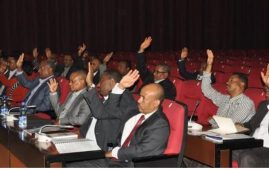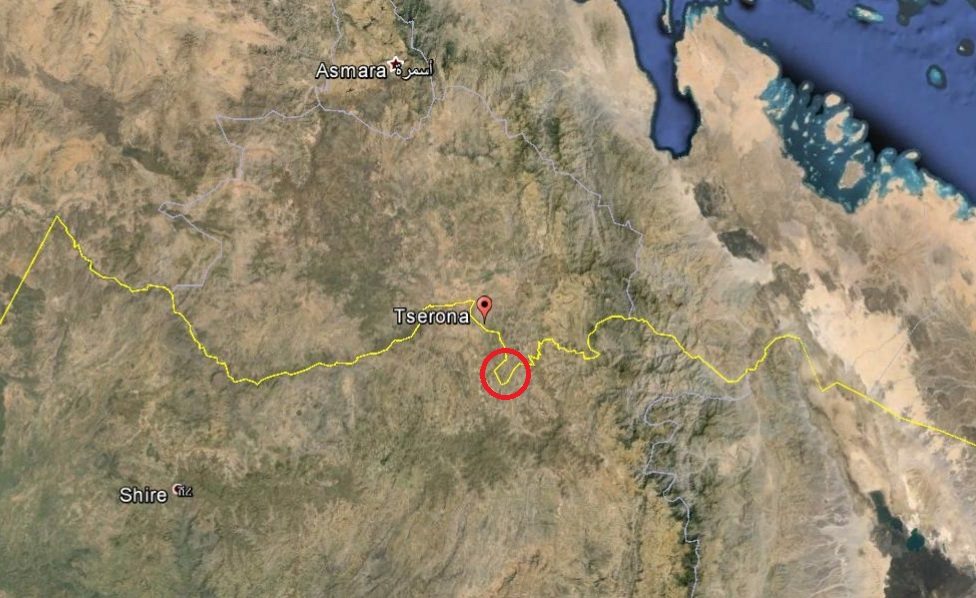Eritrea only sees a lengthening list of enemies
[From: A Week in the Horn of Africa, Nov. 18, 2011 issue.]
The hysteria of Eritrea’s leaders over what they claim is unfair treatment by the international community has reached new levels. While the mountain of evidence pointing to Eritrea’s continued support to extremists in the region increases almost daily, the leaders of the regime in Asmara are still making frantic efforts to deflect the international community’s attention away from their destabilizing activities.
The regime’s response to Kenya’s latest allegations that Eritrea is still actively involved in supporting Al-Shabaab has been particularly telling as a demonstration of the extent to which the regime is prepared to go to deny any responsibility for wrongdoing even when caught red-handed. According to the Ministry of Foreign Affairs of Eritrea, Kenya’s allegation was not only regrettable but it was also a move concocted by Eritrea’s erstwhile foes, notably Ethiopia and the US. With regard to the specific claim that plane loads of arms were delivered to Al-Shabaab in Baidoa, Eritrea’s ambassador to Kenya squarely denied it. He also repeated the regime’s customary claim blaming Ethiopia for being behind Kenya’s allegations, and according to the Ambassador, the allegations are “lies that Ethiopia has been propagating.” He even goes as far as to make the claim, rather bizarre even by Eritrea’s standards, that “even the Al-Shabaab are a creation of Ethiopia which has for several years tried to destabilize our country.”
It is difficult to know what to make of this allegation but it certainly reflects muddled thinking by the official making the statement. It’s a clear indication of the level of desperation the regime has reached in its efforts to shift the blame to others. The Ambassador’s effort seems as much an attempt to curry favor with the Kenyans as to drive a wedge between IGAD members who are collectively calling on the international community to tighten sanctions on the regime in Asmara. The aim appears to be to find another way of dividing the supporters of sanctions and some possibility to avoid their tightening. Given the unanimity of IGAD over sanctions, it seems rather naïve to think that any such strategy might work, but this is a regime which never appears embarrassed by any of its own actions.
One example indeed is hearing an Ambassador of a regime that has long prided itself on its total ‘opposition to external intervention in Somalia” reiterating his government’s support for Kenya’s right to “pursue Al-Shabaab.” This may sound like a principled position born of conviction – except that it is certainly not that. Indeed, the Eritrean official also complained that Kenya hadn’t consulted Eritrea before deciding to pursue Al-Shabaab inside Somalia. It isn’t entirely clear if the Eritrean regime seriously believes Kenya should have secured President Isaias’ approval to protect its own legitimate interests in Somalia. Nor is it clear whether the Ambassador’s complaint is really a Freudian slip admitting to Eritrea’s own continued relationship with extremists in Somalia. Whatever the Ambassador meant, he also made sure he added the usual allegation that Ethiopia “never wanted to see a stable neighbor” in Somalia, following this by asserting that Kenya’s claims were part of “Ethiopia’s bogus propaganda against Eritrea.” Ethiopia, the Ambassador claimed, “even invaded Eritrea in 1998.” What is really interesting about all this, perhaps, is that while the Ambassador was bending over backwards to try to convince the Kenyan officials that his government would support any move by Kenya against “the criminal Al-Shabaab”, he was still flaunting his government’s arrogant claim that Kenya was simply following somebody else’s orders in intervening in Somalia. In effect, the Eritrean Ambassador was denying that Kenya was even entitled to defend its own interests. That’s vintage Asmara.
Meanwhile, last weekend the Eritrean Ministry of Foreign Affairs issued a press release furiously attacking Nigeria and Gabon for sponsoring the draft UN Security Council resolution for increased sanctions against Eritrea. As the regime makes clear in its derisory comments on Nigeria and Gabon it is always ready to attack any one that appears to be critical of its activities, and the main thrust of the Ministry’s press release was that the two countries could not speak for Africa in presenting the case for sanctions. It also accused the two countries of following a “procedurally defective” path that sidelined the AU, insinuating that Gabon and Nigeria are tabling the draft “on behalf of Africa” without being “mandated by the AU.” The Ministry statement claimed the AU ruled out sanctions against Eritrea in its summit in Malabo. It didn’t, and it might be added that Eritrea’s officials continue to misrepresent the fact that the UN Security Council’s original resolution on sanctions was in fact requested by the AU.
The Security Council adopted Resolution 1907 imposing targeted sanctions on the government of Eritrea and selected officials of Eritrea for their support of extremists in Somalia and for the forcible occupation of Djibouti territory as well as for their activities of destabilization in the region as a whole. The council demanded that Eritrea implement the decisions and established a team to monitor the implementation of its decision. The UN Security Council’s decision was unprecedented in that it was passed after the African Union had unanimously passed a resolution requesting the Security Council to impose sanctions against the Eritrean regime. While the Security Council has at various times passed sanctions and resolutions against various member states of the AU, only Resolution 1907 has been passed as the result of a unanimous recommendation by the African Union. Indeed, the AU has never previously recommended a member state to be sanctioned by the UN Security Council, nor has it done so since.
The AU made this unprecedented recommendation essentially because of Eritrea’s continued destabilization of the region as a whole. It was this specific activity that the AU wanted to see resolved. Once the UN Security Council took up the issue and imposed sanctions, it was the UN which followed up events, and made any necessary adjustments to its decisions. It was, of course, the UN Security Council, not the AU, who established the UN Monitoring Group, the sanctions monitoring team.
Prior to the latest report of the Monitoring Team, the victims of the destabilization activities of the Eritrean regime, met through their regional organization IGAD. They reviewed the activities of Eritrea and then appealed to the UN Security Council to tighten the sanctions precisely because this was a matter for the UN Security Council and not for the African Union. A few days before the IGAD Summit met, the AU had held its own Summit in Malabo. It did not, and could not, have raised the issue of Eritrea’s destabilization of the region because it had already pronounced itself on the matter and made its request for sanctions to the UN Security Council. However, it did raise the unresolved border issue between Eritrea and Ethiopia, calling on both countries to resolve the problem through dialogue. This, of course, is precisely what Ethiopia has been asking for in regard to the border dispute for the last seven years.
In other words, Eritrea’s claim that IGAD’s call to the UN Security Council to tighten sanctions, and Gabon and Nigeria’s decision to table a draft resolution, is contrary to AU’s decisions in Malabo is completely untrue. The AU did not raise the issue at Malabo. There is only one way by which Eritrea can escape the tightening of UN Security Council sanctions. It must come clean about all of its destabilization activities in the region, clearly and publicly commit itself to immediately stop all of these activities and present a credible plan and timeline to implement this change in policy. Nothing less will be acceptable, and certainly not its attempts to lie its way out of the corner into which it is now being squeezed.
*************
Re-Publishing items from A Weeks in the Horn, the weekly press release of the Ministry of Foreign Affairs, do not necessarily imply an endorsement of the the claims and arguments therein by this blog.
Check Eritrea archive and Eritrean terrorism archive for related posts.





